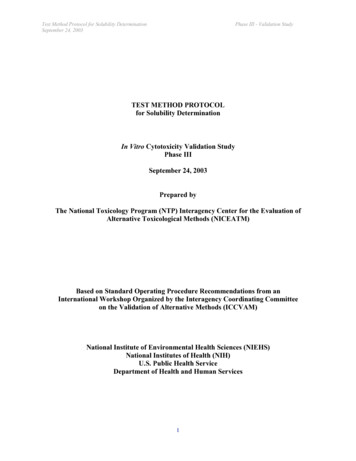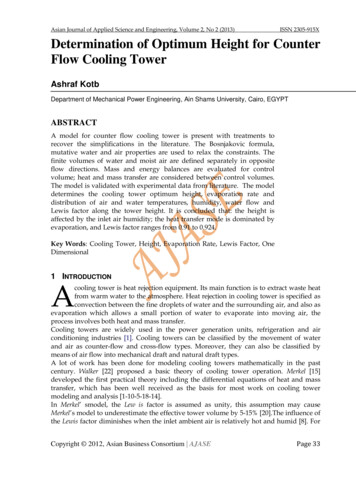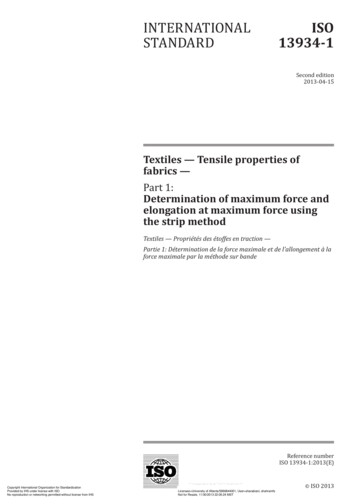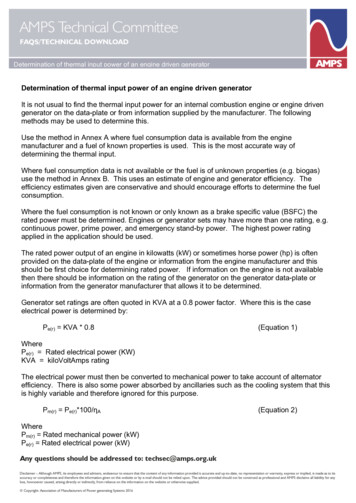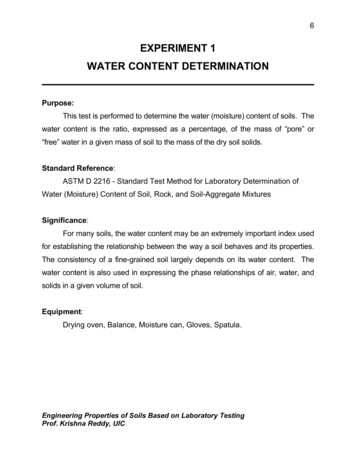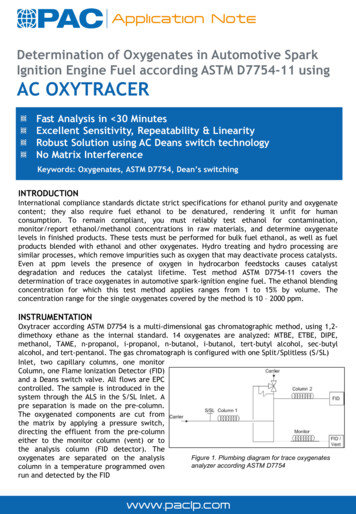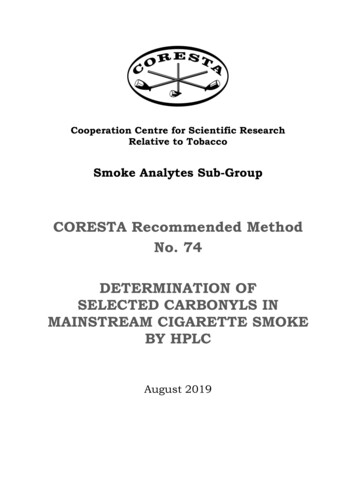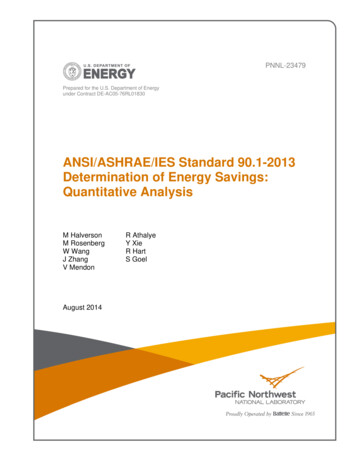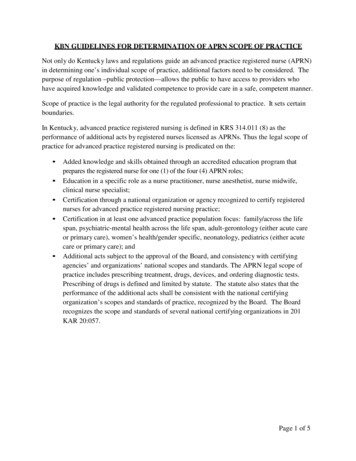
Transcription
KBN GUIDELINES FOR DETERMINATION OF APRN SCOPE OF PRACTICENot only do Kentucky laws and regulations guide an advanced practice registered nurse (APRN)in determining one’s individual scope of practice, additional factors need to be considered. Thepurpose of regulation –public protection—allows the public to have access to providers whohave acquired knowledge and validated competence to provide care in a safe, competent manner.Scope of practice is the legal authority for the regulated professional to practice. It sets certainboundaries.In Kentucky, advanced practice registered nursing is defined in KRS 314.011 (8) as theperformance of additional acts by registered nurses licensed as APRNs. Thus the legal scope ofpractice for advanced practice registered nursing is predicated on the: Added knowledge and skills obtained through an accredited education program thatprepares the registered nurse for one (1) of the four (4) APRN roles;Education in a specific role as a nurse practitioner, nurse anesthetist, nurse midwife,clinical nurse specialist;Certification through a national organization or agency recognized to certify registerednurses for advanced practice registered nursing practice;Certification in at least one advanced practice population focus: family/across the lifespan, psychiatric-mental health across the life span, adult-gerontology (either acute careor primary care), women’s health/gender specific, neonatology, pediatrics (either acutecare or primary care); andAdditional acts subject to the approval of the Board, and consistency with certifyingagencies’ and organizations’ national scopes and standards. The APRN legal scope ofpractice includes prescribing treatment, drugs, devices, and ordering diagnostic tests.Prescribing of drugs is defined and limited by statute. The statute also states that theperformance of the additional acts shall be consistent with the national certifyingorganization’s scopes and standards of practice, recognized by the Board. The Boardrecognizes the scope and standards of several national certifying organizations in 201KAR 20:057.Page 1 of 5
The following questions related to education and certification, personal competence, evidencebased practice, and specific patient circumstances and practice environment will assist theindividual licensee to consider whether a particular act or procedure is within the APRN’s scopeof practice.1.How do I determine whether an act is within my scope of practice?Define or describe the act/task/procedure. What am I wanting to do or being asked to do?Should I perform this act/task/procedure?2.Is the act/task/procedure expressly prohibited by the nursing law, regulations, advisoryopinions, or other local, state, federal laws?3.Is the act/task/procedure expressly permitted by the nursing law, regulations, advisoryopinions, or other local, state, federal laws?Law & RegulationsAn APRN (licensed by the Board and certified by a national organization in anadvanced practice role and population foci) must first determine whether the statutes(the Nurse Practice Act) prohibit the action in question. For example, an APRNdesignated as a Family Nurse Practitioner may not write a prescription for aSchedule II drug for 30 days. This action would be outside the APRN, designatedFNP’s scope of practice. (KRS 314.011(8)(a) 4.Am I licensed to practice in the appropriate role/population foci?Do my qualifications, training, and licensure match this role and how Idefine my role with the public?Is the information regarding my training easily accessible and can it bevalidated to the licensure board, the public, health care credentialing staff,facilities, a court of law and other interested parties?Is the act/task/procedure consistent with my graduate education, current nationaleducational accreditation standards, current nursing scope and standards, currentcertification examination blueprint/outline/role delineation study, current evidencebased nursing literature, my institution’s policies and procedures, the institution’saccreditation standards?Page 2 of 5
Advanced Educational PreparationThe APRN must determine whether his/her program of study gave the APRN a knowledgebase upon which to accomplish the action. Did I complete a postbasic, accredited educational program that prepared me todiagnose and manage the care of patients in this population (family, adultgerontology, neonatology, pediatric, psychiatric/mental health, women’s health) ofpatients? Did the curriculum for my population focused advanced practice educationalprogram provide the basic background knowledge for the APRN to develop newskills to perform this act in a safe and effective manner? Did my postbasic accredited educational program prepare me to practice primarycare or acute care with the population of patients for which I am planning todiagnose and manage care? Did my postbasic accredited educational program include supervised clinical anddidactic training focusing on this population? How did I acquire the additional knowledge and skill to perform the act?Certification Based on Professional Scope and StandardsNext, the APRN must determine whether the action is consistent with the scope andstandards set by the national certifying organization that certifies the APRN. Generally,these scope and standard statements are written in broad language and will probablysupport most actions. However, there may be exceptions. Do professional nursing standards support or validate what I am doing? Is additional certification required to do this skill on an ongoing or specializedbasis?Is this act/task/procedure consistent with current nursing literature and research,and institution policies and procedures?Evidence-Based Research and Community StandardThe APRN should ascertain whether there is evidence supporting the performance of theaction by the APRN. Also, does the standard of practice within the community support theAPRN’s performance of the action? Is this act supported by evidence based research?5. Do I have the requisite knowledge, skill and experience to do the act/task/procedure? Have I practiced this act/task/procedure?Page 3 of 5
Could I defend my actions if an adverse event occurs? Can I produce documentation/evidence that I have acquired the APRN knowledge,skill, and experience to perform the act/task/procedure? Can I safely perform the act/task/procedure?Personal Knowledge, Skill and Ability CompetenceOnce the action is determined to be within the legal scope of practice of an APRN, theindividual must determine whether he/she has the knowledge, skill and ability to safelyperform the action themselves. Does the APRN need additional education or training? Did I complete a postbasic accredited educational program that prepared me forsub-specialization (limited portion of a narrowly defined professionaldiscipline)? Did I complete a program beyond my postbasic accredited educational programfor my advanced practice role/population focus that provided me additionalknowledge and expertise in a more discrete area of specialty practice? Have I completed a specialty preceptorship, fellowship, or internship thatqualifies me beyond my basic educational training?6.Individual Patient ConditionThe patient’s condition and acuity level are the primary factors in determining the mostappropriate APRN to manage the patient’s health care needs, not the setting of care.Neither a primary care APRN nor an acute care APRN is restricted to providing care inany particular setting. (NONPF, 2013) What are the circumstances and the condition of the patient for whom the actsare being performed? Do I have the knowledge and training to differentially diagnose and manage theconditions for which I am seeing this patient? What are the clinical competencies/skills required to treat this condition? How have I achieved and demonstrated competence and maintainedcompetence? Does the act involve independent judgments and decisions that require asubstantial knowledge base to assure patient safety and welfare?Page 4 of 5
What are the potential complications and adverse reactions which may result from theactions and do I have the knowledge required for the recognition of adverse reactionsand ability to take appropriate nursing interventions as required? Am I personally prepared to accept and manage the consequences of my diagnosisand treatment, or do I have a formally established relationship with a provider who istrained and immediately available? (201 KAR 20:057 Section 3) Am I an expert, adequately knowledgeable or a novice provider in this field?Kentucky Revised Statutes [KRS 314.021(2)] state:“All individuals licensed under provisions of this chapter shall be responsible andaccountable for making decisions that are based upon the individuals' educational preparationand experience in nursing and shall practice nursing with reasonable skill and safety.”Kentucky Administrative Regulations [201 KAR 20:057 Section 3] state:“In the performance of advanced practice registered nursing, the advanced practiceregistered nurse shall seek consultation or referral in those situations outside the advancedpractice registered nurse's scope of practice.”7.Setting/Patient Care Environment What is the “accepted standard of care” which would be provided by anotherreasonable and prudent practitioner with similar training and experience? Does the environment that I work in support this scope of practice through structuressuch as staffing, consultation, policies and procedures, protocols, and communitystandards? Do I need to seek consultation and referral for the care of this patient? (201 KAR20:057 Section 3) What are the potential consequences of accepting treatment responsibility for thispatient? If I am not the primary care provider, will my responsibility for the provision of carebe shared with the primary provider? Is the safety of the patient at acute risk if I do not act? Will the safety of the patient be compromised if I do act? Is there a personal or formal relationship with this patient that would potentially affectmy ability to provide or to deny care?8.What is my decision to perform or decline to perform the activity or task?Approved: 4/2015Page 5 of 5
Kentucky Board of Nursing (KBN) Scope of Practice Decision-Making Model for APRNsUse the process flow below to think through your scope of practice decision. Please see the Kentucky Board of Nursing (KBN)Guidelines for Determination of APRN Scope of Practice for additional consideration.Define the activity or task; clarify the problem.a. I am being asked to ,b. Should I do ?Is the activity or task expressly prohibited by KYNursing Laws & Administrative Regulations, advisoryopinion statements, or other laws (state, federal)?YESIs the activity expressly permitted by KY Nursing Laws& Administrative Regulations, advisory opinionstatements, or other laws (state, federal)? Am I unsure?UNSUREIs the activity or task consistent with my APRN education, population foci &certification, national standards of practice, current APRN competencies,current nursing literature and research, institution policies and procedures,institution accreditation standards, information on certification test contentoutline, or role delineation study?Do I have the required knowledge, skill and experience to do the activity ortask?a. If I do this activity or task, can I defend myself if an adverse event occurs?b. Can I produce documentation/evidence that I have the APRN knowledge,skill, education, and experience to do the activity or task?c. Am I confident that I can safely do the activity or task?Am I prepared to manage the consequences and results andaccept accountability for my actions and decisions?UNSUREWill the patient be safe and have no harm if I do this task?UNSUREWhat is my decision to perform or decline to perform the activityor task according to the currently accepted standards of care andin accordance with my institution’s policies and procedures?Acknowledgements:Adapted and reprinted with permission from the American Nurses Association 2015.Based on KBN Decision Tree/Guidelines for Determining Scope of Practice, Approved 2/88.3/16/15
Certification through a national organization or agency recognized to certify registered nurses for advanced practice registered nursing practice; Certification in at least one advanced practice population focus: family/across the life span, psychiatric-mental health a
